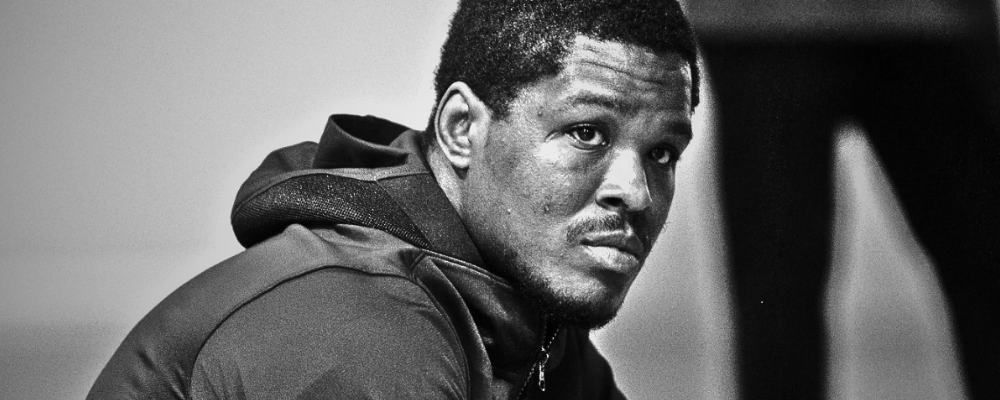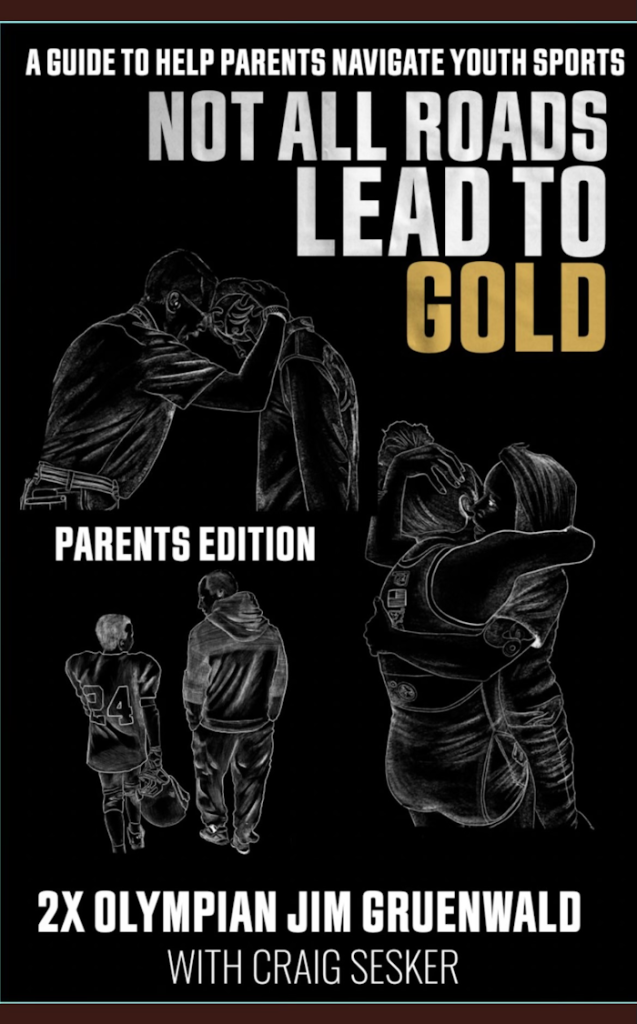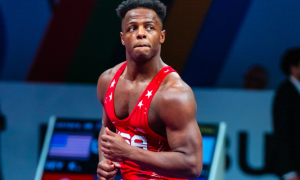The nice part about the whole thing is enjoying an immediate mutual understanding. No cursory warnings, no checking to see if any questions are off-limits. Not a word prior to recording needs to be said. RaVaughn Perkins (77 kg, NYAC) knows precisely what the tone of my questions is going to be as if he can read my mind from 1,700 miles away.
Such is the benefit of a relationship that has extended beyond the confines of competition and its accompanying coverage. Buoyed by a reciprocal respect for each other’s roles, Perkins and I have always been able to compartmentalize with regards to all matters big and small — which is harder than it sounds when it comes to an endeavor that is often all-encompassing on his part and deeply personal for both of us. Wrestling is not just a sport, but also a lifestyle.
That’s okay. What is decidedly not okay is attaching one’s identity and overarching sense of self to outcomes.
Perkins — long one of the United States’ best and most consistent competitors — can separate who he is from whatever the scoreboard reads following a match. Therefore, when there have been instances of struggle and disappointment, he does not take my detailed descriptions of said results personally, nor does he have any qualms when this platform lifts up those fortunate enough to have on occasion acted as his vanquishers. He is not alone pertaining to this topic, thankfully, as there are other athletes with whom I hold important personal connections who can easily handle the temporary moat that forms between us in order for Five Point Move to appropriately and accurately cover events. Some of them, like Perkins, have even once in a while contributed directly to 5PM’s content plan. But there is a difference, especially over the past few years. If not perhaps even longer than that.
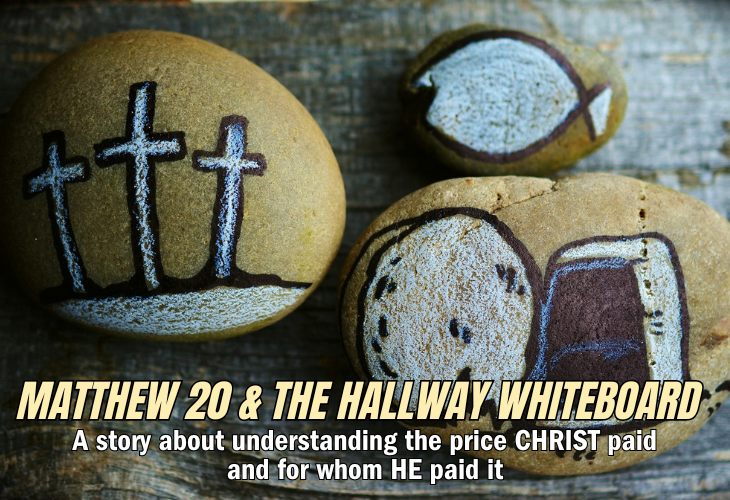
While every high-level full-time athlete has to contend with injuries, Perkins’ own history on this front, recent and otherwise, might as well function as a case study in perseverance. An apt phrase with which to paint Perkins is “in spite of”, and you can apply it to the myriad physical hindrances he has had to endure. Feel free to play along. ‘In spite of competing with a broken back, Perkins still answered the call to try and qualify 66 kilograms for Rio after winning the Olympic Trials’; in spite of having a torn groin, Perkins managed to recover at the ’20 Trials and once again make National team; in spite of his back being damaged once more, Perkins advanced to the World Team Trials finals; in spite of another torn groin, Perkins still suited up for the Nationals in December even though the slightest bit of leg-driving caused mind-numbing pain…’ That’s the phrase. Remember it — in spite of, in spite of, in spite of…
But you, the reader, only know of these things because they have been published in various articles and recaps. Perkins himself never volunteers that information, nor has he or would he ever take anything away from opponents who have had their hands raised against him. If 31-year-old Perkins is competing, injured or not, it is because he is convinced of victory. To bemoan a result after the fact would run counterintuitive to a confident disposition. At the same time, he does not behave with pretense, either. If he is asked about injuries on the record, he gives an honest answer, for to try and obscure the truth would be in its own way an ego-serving exercise. And that’s just not who he is.
The primary reason why this, any of this, is of note has to do with the imagination. It is also not complex. Perkins, a legitimate World-caliber wrestler who holds the respect of top foreigners from around the globe, has had to bite down on competing physically compromised seemingly more often than not throughout his sparkling career. You would have to figure that within the recesses of his mind, he has been screaming in frustration. But, no. No, he has not. Rather, Perkins has continuously exhibited a combination of calmness and pragmatism, which in turn has actually instilled in him a constant swelling of gratitude for his altogether unique pursuit of greatness. A pursuit that is as sincere and enthusiastic, if not more so, than ever before.
Perkins says that he is just “glad to be here” but that is not code for complacency. He does not mean it as if his mere participation in the objective. Take a 180 route when happening upon that part of the piece. The odd item in this latest conversation, held six days prior to the 2024 US Olympic Team Trials, is that Perkins is these days feeling quite well. You could almost say “healthy”, though that is a relative term one might suppose. But, no kidding, he has been clicking on virtually all available cylinders. Likely for the first time in a long while. That’s not just from his own mouth. Others who operate in the same eco-system as him have expressed likewise. Be it adequate rest, nutrition, the maturity that comes from experience with gauging his body’s response to training, or all of the above, Perkins is fitfully-weaponized for battle next week. Strong, agile, quick, instinctive, and ready to write one more chapter in what has been the inspiring story of a man not defined by what he does, but by how he does it. And more importantly, how he treats those around him.
5PM Interview with RaVaughn Perkins
5PM: You do not talk about this stuff publicly, but you have had to deal with several injuries and a lot of pain over the past few years. When recapping performances of yours, I’ve mentioned you being injured. I’ve done this without being specific, but I have also done it without speaking with you about it beforehand. Has that bothered you? The other part to that is, how have you been able to get through the physical issues and still maintain a positive attitude?
RaVaughn Perkins: It doesn’t bother me at all. I just look at it as you are letting the people know that I’ve been dealing with this type of stuff. I don’t want to be the one to get it out there, but you are showing people what I have been dealing with. I’m happy that you are being the voice for me because I won’t say what has been going on with me. Only my partners and coaches are the ones who know. People on the outside, they don’t know what is going on with me. But it doesn’t bother me at all that you mention it.
As for getting through it, I do this for me, for my family, and I do this for my fans. I see it like this: everyone has something going on with them, no matter if it is serious or not. My family, especially coaches like Herb (House), every time he sees me training with these World Champions, he says, If we could just get you healthy, no one can beat you. That keeps me motivated. That keeps me going. And just having my family behind me knowing that I can still be great even with these injuries. They know what’s going on. I don’t say anything to them about it, but they will see it and still say, You look good out there. But they don’t know what’s going on, how injured I am, or what happened to me. Just for them to say that I’m wrestling this good — when they don’t even know about these injuries — helps me to keep going.
5PM: When you have gone overseas during this time, you have competed against some top foreigners, and here domestically you are always facing our country’s top guys. When you have lost matches, you have lost them very close. In my opinion, injuries have obviously affected your results. Whether you agree with that or not, what do you say to yourself after these matches?
RP: When I was younger, I would probably look at myself and say, Am I really ready for this? That type of stuff. But now, I just move on. That match happened and I lost. Let’s get ready for the next one, such as the next competition or whatever. I really don’t look back on it. Of course, I know that I’m injured. So then it is, What can we do to help us win the next match without having to deal with these injuries? Do I have to stand in someone’s face? Relax more? Make less attempts? I don’t really blame the injuries at all.
5PM: How did you take the news when Matt Lindland got let go and how did you adjust to the changes that wound up being put in place in the time since?
RP: I took that very hard, both him and Momir (Petkovic). Momir left in, what, 2019? And both were one of the main reasons for the success that I was having. We talked about this. I was always wrestling with my waist bent over and with my hips back. Once I came to the OTC, they both helped me with my position and everything. It really hurt me, first losing Momir and then losing Matt. Losing Matt actually made me step back from the sport a little more.
I was all over the place at the time and didn’t know what I wanted to do. But then it became, Okay, life moves on and I still want to become the champion that I have worked to become. But he is always going to be part of my success. I have to keep that in my head and just move forward. He has always wanted the best for me. Whenever I make it to the top, or even if I don’t, I know that he helped me a lot to get to where I’m at. I took that hard. I took that very hard. And I’m still not over it. I’m still not over it, but there is nothing I can do. I still talk to him once in a while. He is always going to be “Coach” to me.
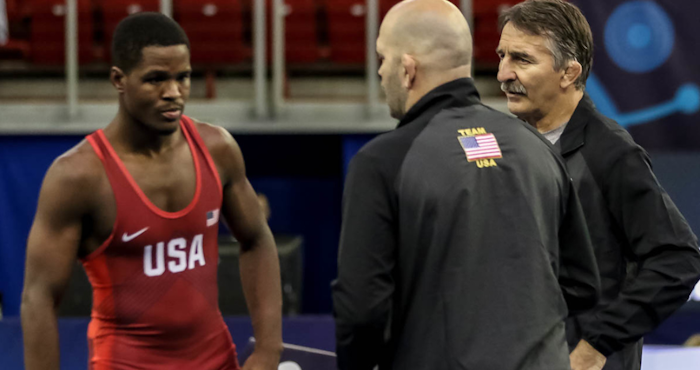
5PM: Tell me about Cheney (Haight) and (Ismael) Borrero. How have they been for you?
RP: They’ve been great. I like Borrero a lot. He knows what it takes to be a champion in this time with this rule-set that we have. He knows what it takes to be a champion. He is pushing everyone. He is not stuck on one single person. I’ve never had to deal with that, anyway, but he loves this sport and wants to see everyone get better. I liked him so much when he came because he is a realist. When he first arrived, he said it. He said, It’s not going to happen overnight. We’re not going to be the greatest by tomorrow. But in a couple of years, we will have our guys ready. He’s great. I love his energy.
And Cheney, it has been great having him in the room after all these years dating back to when he was still competing. People look at me as the veteran in the room but I look at Cheney as the veteran. He is still down to get in there and scrap if you need him. It’s great having him in the room.
5PM: Obviously, the dynamic between you and Ellis (Coleman) is not limited to what happens on the mat. You guys have been very close for a long time, been through a lot together, even back when you both were in the same weight class and were rivals. I think a lot of people who are familiar with our program naturally associate you two with one another given the texture of your relationship. You’re both preparing for your fourth Olympic Trials appearances, which shows how long you and him have been doing this. Now that he is back, does it bring about a pause for reflecting on how your journeys have intertwined?
RaVaughn Perkins: Oh, yeah. During his suspension, I was always asking him, When are you going to be back on the mat? I was ready for him to get on the mat because he is like a brother to me. Having someone who came from the same situation as I did growing up has been a source of motivation. Because, a lot of people where I’m from did not make it to where I have due to troubles back home and stuff like that.
So, Ellis being back on the mat is amazing. It is going to motivate me. It is going to make me go even harder. It was difficult when we had to wrestle each other 2016 Olympic Trials. Every year after that, since we have no longer been in the same weight class, we’ve said, Oh, we’re going to make this Team together, we’re going to win these medals together. It hasn’t happened that way yet; but now that he is back, it is a real motivation for me. We communicate a lot. I’m so happy when he calls me or whenever I call him and it’s great knowing that my brother is back on the mat. And we’re both ready. Even with our age, I’m ready and I know that he’s ready.
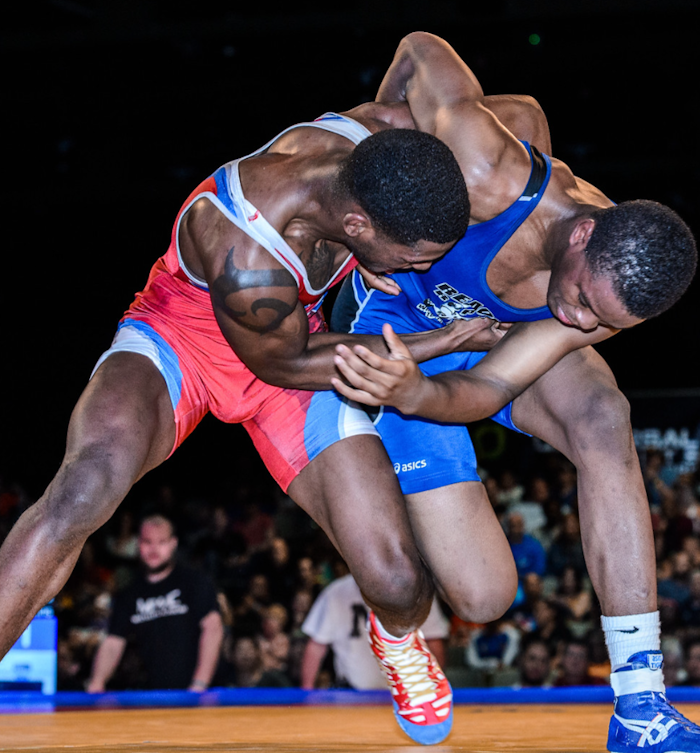
5PM: You have seen a lot of young and promising athletes enter the US program, and you have seen a lot of young and promising athletes leave our program. Whether at the OTC or from other training centers, it happens, and every quad is almost like a signal for bringing in new guys. But right now at the OTC, there is a group of really good young guys, and plus they have actually been around for a while now. What makes this current group of young guys at the OTC different?
RP: These guys want to win. I see them everyday. I see them putting in the work. They do everything that Borrero tells them to do. They’ll say something like, Uhhhh…., but they will do it. They’ll get to it. I have seen them work so hard. Even when they say ‘My body is hurting’, they are back the next day.
I see a great future for Greco — and not even just with the OTC guys. NMU guys, also. I see the competitiveness that they have. It is amazing to see how much talent that we have in Greco. It is not just three guys who can possibly make a Team anymore. The top-5 or top-6 can make a Team. I’m just happy to be able to witness that. All of these guys want to win and be the best, and they are putting that work in. Most of the time, you hear guys say ‘I want to be the best’, but those who say it don’t work their hardest to get there. They want to do minimal to get there. These guys, they are pushing through whatever is being asked of them. We’ll do matches and right after have a circuit. There is no complaining. They trust the coaches. They are down for whatever, and I love that about all of these guys up here.
5PM: Entering this season and recognizing that it is an Olympic Year, and you don’t know for sure what is going to happen in four years, did you feel a sense of urgency?
RP: Not really. I tell everyone, ‘I’m having fun’. I enjoy this sport. I love it. I love being around the younger guys and having optimism for what the future holds. I’m just glad to be here. I’m glad to still be here competing with the younger guys. I’m going along with the ride and still having fun. I really don’t look at the injuries like that because I’m having fun and enjoying it. The injuries don’t really take a toll on my mental because I’m having a great time. Plus, I feel like I’m doing better on the injury side of things. I’m glad to be here still, and I hope that my training partners are glad that I’m here to still help them out, as well.
5PM: Internationally, we saw what happened at the European Olympic Qualifier, and the Asian Qualifier is the same weekend as the Trials. Even though you are getting ready for the Trials where the goal is to win that and then go qualify the weight, have you paid attention to what’s out there potentially waiting for you in Turkey?
RP: Of course. Yes, of course. I watched the European Qualifier and that motivated me even more because you see how anyone can be beaten. You had (Zoltan) Levai, who lost to Finland (Jonni Sarkkinen). I lost to Finland, as well, in a 3-2 match I believe. That just motivated me to know that I can get this done. Any of these guys can be beaten. I’m ready for whatever they have to offer.
5PM: The Olympic Trials brings a more mainstream audience even compared to a World Team Trials. What do you hope first-time viewers get out of watching the Greco portion next weekend?
RaVaughn Perkins: That is really a tough question because I have been in this sport for a long time and it is tough to hear others say ‘Greco is boring’. I wish they would study it before they come to the competition so that they can see how technical Greco really is. That is when they will notice, Hey, this is really an art. I never knew how difficult it is, instead of just harping on only two scores or whatever.

Listen to “5PM57: Kamal Bey and David Stepanyan” on Spreaker.
Listen to “5PM56: Rich Carlson and Spencer Woods” on Spreaker.
SUBSCRIBE TO THE FIVE POINT MOVE PODCAST
iTunes | Stitcher | Spreaker | Google Play Music

Notice: Trying to get property 'term_id' of non-object in /home/fivepointwp/webapps/fivepointwp/wp-content/themes/flex-mag/functions.php on line 999

